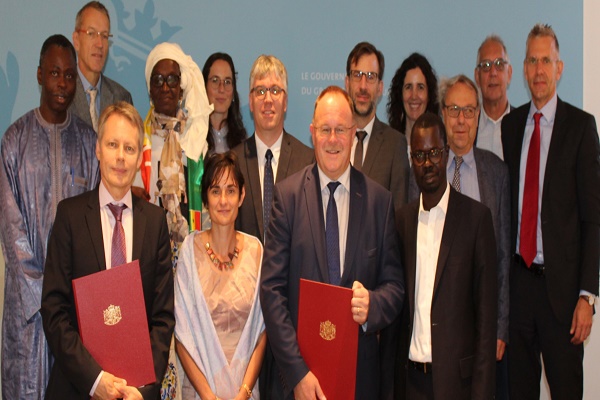 L-R (front): Prof. Markus Ollert, LIH; Dr. Carole Devaux, LIH; Romain Schneider, Minister of Cooperation and Humanitarian Action; Daouda Diouf, Enda Santé;
Credit: MAEE
L-R (front): Prof. Markus Ollert, LIH; Dr. Carole Devaux, LIH; Romain Schneider, Minister of Cooperation and Humanitarian Action; Daouda Diouf, Enda Santé;
Credit: MAEE
Today marked the launch of Luxembourg's "Casamance Research-programme on HIV-Resistance and Sexual Health, 2018-2022" agreement, otherwise known as CARES.
On 28 June 2018, Minister of Cooperation and Humanitarian Action Romain Schneider signed a new agreement with the Luxembourg Institute of Health (LIH) called CARES (Casamance Research-programme on HIV- Resistance and Sexual Health).
The HIV, hepatitis B (HBV) virus - the leading cause of death from liver disease - and the HPV virus, which causes cervical cancer, are at the root of serious public health problems in West Africa. Through operational research and capacity building, the CARES project will aim to improve access to diagnosis and treatment of HIV-infected people, thereby reducing HIV, HBV and HPV-related mortality in the regions of Ziguinchor in Senegal (Casamance) and Guinea-Bissau.
At the signing, Minister Schneider recalled that "Luxembourg remains firmly committed to the fight against communicable diseases", while highlighting "the partnership and multidisciplinary approach that guided the development of the CARES project from its very beginning."
The LIH will ensure the overall coordination of the project on the research and training components, while operational coordination with the health structures and associative partners in Senegal and Guinea-Bissau will be entrusted to the international NGO ENDA Santé. The Centre hospitalier de Luxembourg (CHL), the Luxembourg National Health Laboratory (LNS) and the AIDS Research Foundation will be involved in the research, training and support aspects of universities and hospitals in Ziguinchor and Bissau. Meanwhile, the Luxembourg NGO Stop Aids Now / Access (SAN/ACCESS) will focus on the effects of stigma and discrimination in access to health in collaboration with Johns Hopkins University.
"The CARES project is a concrete example (...), which aims to take advantage of the comparative advantages that Luxembourg and African health structures, universities and public research institutes as well as civil society can offer on both sides of our borders," concluded Minister Romain Schneider.








